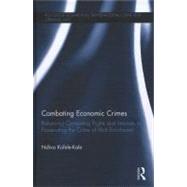Combating Economic Crimes: Balancing Competing Rights and Interests in Prosecuting the Crime of Illicit Enrichment
, by Kofele-kale; Ndiva- ISBN: 9780415778473 | 0415778476
- Cover: Hardcover
- Copyright: 11/22/2011
In the last decade a new tool has been developed in the global war against official corruption through the introduction of an offense of illicit enrichment in almost every multilateral anti-corruption convention. Illicit enrichment is defined in these conventions to include a reverse burden clause which triggers an automatic presumption that any public official found in "possession of inexplicable wealth" must have acquired it illicitly. It is then up to that official to explain how he acquired such wealth, and failing to "reasonably explain" the sudden increase in his wealth, in relation to his lawful earnings during the performance of his functions, the official could be found guilty of the offense of illicit enrichment. Thus, rather than requiring the prosecution to initially prove the illicit nature of official's assets, these multilateral conventions have opted for reversing the onus on the accused official to explain how he came about to possess such sudden wealth. However, reversal of the burden of proof clauses raise an important human rights issue since they conflict with the right to be presumed innocent. Unfortunately, the recent spate of international legislation against official corruption provides no clear guidelines on how to proceed in balancing the right of the accused to be presumed innocent against the competing right of society to trace and recapture illicitly acquired national wealth.Combating Economic Crimes therefore sets out to address what has been left unanswered by these multilateral conventions, to wit, the level of burden of proof that should be placed on a public official who is accused of illicitly enriching himself from the resources of the State, and the right balance to be struck between the accused individual's right to presumption of innocence and the protection of legitimate community interests and expectations to a corruption-free society. The book explores the doctrinal foundations of the right to presumption of innocence and reviews the basic due process protections afforded to all accused persons in criminal trials in treaty, customary international law, and municipal law. The book then goes on to lay out a framework for balancing and 'situationalizing' competing human rights or public interests in situations involving possible official corruption.






